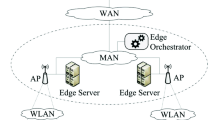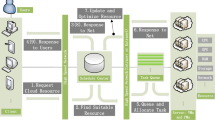Abstract
Edge computing is proving to be a promising model, offering low-latency and high-bandwidth services to the end-users. However, due to the dynamic nature of the network and the heterogeneous computing resources, task scheduling in edge clouds remains a challenging problem. In order to solve this problem, we propose a novel task scheduling algorithm for edge clouds based on deep reinforcement learning, which combines a deep Q-learning network with a priority-based action selection strategy. This approach aims to optimize computing resource allocation while minimizing energy consumption in edge nodes. We evaluated the effectiveness of our algorithm using a simulated edge cloud environment and compared it with other advanced task scheduling algorithms. Experimental results indicate that our algorithm outperforms baseline algorithms in terms of delay and energy consumption. In particular, our method improves task completion time and energy efficiency compared to traditional scheduling algorithms.
Access this chapter
Tax calculation will be finalised at checkout
Purchases are for personal use only
Similar content being viewed by others
References
Zhang, Y., Chen, X., Chen, Y., et al.: Cost efficient scheduling for delay-sensitive tasks in edge computing system. In: 2018 IEEE International Conference on Services Computing (SCC), pp. 73–80 (2018)
Robles, A., Skarmeta, A.: A multi-layer guided reinforcement learning-based tasks offloading in edge computing. Computer Networks 220, 109476 (2022)
Wang, X., Ma, L., Li, H., et al.: Digital twin-assisted efficient reinforcement learning for edge task scheduling. In: 2022 IEEE 95th Vehicular Technology Conference: (VTC2022-Spring), pp. 1–5 (2022)
Zhao, X., Wu, C.: Large-scale machine learning cluster scheduling via multi-agent graph reinforcement learning. IEEE Trans. Netw. Serv. Manage. 19(4), 4962–4974 (2022)
Song, F., Xing, H., et al.: Offloading dependent tasks in multi-access edge computing: a multi-objective reinforcement learning approach. Futur. Gener. Comput. Syst. 128, 333–348 (2022)
Possebon, I., Silva, B., Da, C., Schaeffer-Filho, A.: Look-ahead reinforcement learning for load balancing network traffic. In: 2022 IEEE Symposium on Computers and Communications (ISCC), pp. 1–6 (2022)
Shahidani, R., Fatemeh, A., Ghasemi, A., et al.: Task scheduling in edge-fog-cloud architecture: a multi-objective load balancing approach using reinforcement learning algorithm. Computing 105, 1337–1359 (2023)
Panin, A., Shvechikov, P.: Practical Reinforcement Learning. Coursera and National Research University Higher School of Economics (2017)
Arulkumaran, K., Deisenroth, M., Brundage, M., Bharath, A.: Deep reinforcement learning: a brief survey. IEEE Signal Process. Mag. 34(6), 26–38 (2017)
Filhd, M., Oliveira, R., Monteiro, C., et al.: CloudSim plus: a cloud computing simulation framework pursuing software engineering principles for improved modularity, extensibility and correctness. In: Integrated Network & Service Management, pp. 400–406 (2017)
Youn, J., Han, Y.: Intelligent task dispatching and scheduling using a deep Q-network in a cluster edge computing system. Sensors (Basel) 22(11), 4098 (2022)
Li, X., Fang, Y., et al.: Resource scheduling for UAV-assisted failure-prone MEC in industrial internet. Drones 7, 259 (2023)
Ran, L., Shi, X., Shang, M.: SLAs-aware online task scheduling based on deep reinforcement learning method in cloud environment. In: 2019 IEEE 21st International Conference on High Performance Computing and Communications, pp. 1518–1525 (2019)
Acknowledgments
This work was supported in part by the National Natural Science Foundation of China (62272256), Shandong Provincial Natural Science Foundation (No. ZR2021MF026), the Piloting Fundamental Research Program of Qilu University of Technology (Shandong Academy of Sciences) (2022XD001, and the Colleges and Universities 20 Terms Foundation of Jinan City China (202228903).
Author information
Authors and Affiliations
Corresponding author
Editor information
Editors and Affiliations
Rights and permissions
Copyright information
© 2024 The Author(s), under exclusive license to Springer Nature Singapore Pte Ltd.
About this paper
Cite this paper
Xun, M., Yao, Y., Yu, J., Zhang, H., Feng, S., Cao, J. (2024). Deep Reinforcement Learning for Delay and Energy-Aware Task Scheduling in Edge Clouds. In: Sun, Y., Lu, T., Wang, T., Fan, H., Liu, D., Du, B. (eds) Computer Supported Cooperative Work and Social Computing. ChineseCSCW 2023. Communications in Computer and Information Science, vol 2012. Springer, Singapore. https://doi.org/10.1007/978-981-99-9637-7_32
Download citation
DOI: https://doi.org/10.1007/978-981-99-9637-7_32
Published:
Publisher Name: Springer, Singapore
Print ISBN: 978-981-99-9636-0
Online ISBN: 978-981-99-9637-7
eBook Packages: Computer ScienceComputer Science (R0)





